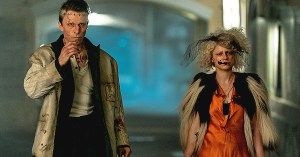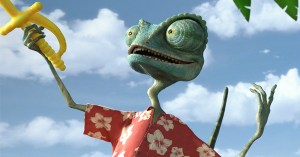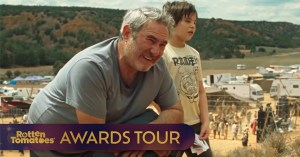NYFF: Tom Hanks and Paul Greengrass talk Captain Phillips
The 51st New York Film Festival opened this weekend with Captain Phillips, Bourne Ultimatum director Paul Greengrass’s tension-riddled retelling of a true story in which an American cargo ship was hijacked by Somali pirates in 2009. Tom Hanks plays the besieged skipper, Rich Phillips, with newcomer Barkhad Abdi leading the band of pirates. RT was there as both actors joined Greengrass for a chat about the making of the film, staying true to the essence of the events — and that time the seasick crew threw up all over Hanks. Let no one say that acting isn’t hard work.
Was it a challenge adapting the true story to film?
Paul Greengrass: That’s one of the central challenges we faced — how to stay true to events and compress the fundamentals. But I think we did. I think the fundamentals of what happened are there on screen.
Barkhad, what was it like to play this character?
Barkhad Abdi: The experience was really interesting. It was a first, and the whole crew just made it really easy for me. It was challenging at first, but we did whatever we could to get it out there, to get it as true to the content of the story.
Tom, did you spend time with real Captain Phillips?
Tom Hanks: I did, I read his book prior to reading the screenplay, and I did get together with him on two occasions — and explained to him, you know, “It’ll say things you never said, and be places you never would,” but if we do this right, thematically we will be spot-on with the nature of what happened to him, and how. It’s a very environmental movie, I mean, shooting it as we did on a on board a ship that was more or less identical to the Alabama, at sea or in these very small confines. So I think the task, in folding ourselves into Paul’s good hands, is to always be true to the motivations of everybody that is involved. When, for the sake of storytelling, you start manufacturing moments that were truly not part of the five or six days, well then I think you can get into trouble there. I could probably walk you through it and say, “That’s a moment that didn’t happen, but thematically it is what happened,” and that’s tricky and it can get away from you , but we were always searching for that combination of procedure and behavior that were going to be not just reminiscent but reflective of what really happened. And that’s tough when you’re telling non-fiction entertainment.
Paul Greengrass: You face challenges and you have to make choices. You’re weighing the necessary responsibility toward reality and authenticity and of course the need to create a compressed drama over two hours. One of the issues in this film was that Richard Phillips was, of course, in command of a crew of some 25 men who also went through this experience. I mean, obviously Richard Phillips’s was the worst because he was taken off the ship and into the lifeboat, but what we tried to convey was not to forget the crew and the role that they played — both each as individuals and the role that a number of those crew members played in the unfolding events. I think one of the things I’m most proud of in this film is that you sense that crew moving together as one.
The film’s final scene is particularly intense — can you talk about that?
Paul Greengrass: I’m going to talk a little bit about Tom. Acting is many things. Acting is playing lines, of course, but it’s much more profound than that. Acting is truth-telling, and trying to find the truth in a human situation, which will be sketched out by a screenwriter with all the skill that a screenwriter can do; but in the end, that’s just the map of the journey. The actor’s job is to divine and embody the truth, and find it. And that day was a very case in point because we shot the scene upstairs, which was a sort of somewhat similar scene — because I think we both felt that there had to be a cathartic scene for Phillips, somewhere we you knew what it meant and could feel it — and it was perfectly okay, but I think we both knew it wasn’t it. But when we got down to the infirmary [for the new shots] we could feel something. I said [to Tom] “Did you feel something?” and he said “Yeah. Everybody’s being nice to me after 16 weeks of people pulling guns in my face.” [Hanks laughs] But what I mean is what that is — and you see it with great actors, of which Tom obviously is one — where you see a door, it’s just a tiny gap; the door is there, it just takes courage as an actor to walk through and find the truth. That’s what’s there in that scene: the truth of vulnerability and confusion and all of the things you would expect of an experience like that. Whenever I see that scene there’s a shocking sense of humanity — and that’s an actor finding the truth. You have to seize those moments, and Tom did.
I’ll say the same for Barkhad as well, you know. There’s a great challenge in this film, and that’s how do you present young men intent on kidnap and piracy and mayhem? How do you present that in a way that’s truthful? In other words, you don’t sentimentalize what they’re about — you are clear about its moral essence, which is dark and dangerous; and yet, find by degrees the humanity of that, so you get a portrait of complexity and humanity. And Barkhad did exactly the same. When I will remember this film in years to come, I will think about these two men head-to-head in this intense psychological study at the heart of this film. And I think they’re both performances of great profundity and truthfulness.
How do you maintain your composure shooting on the water like you did?
Tom Hanks: Barkhad was on that boat out there for a long time, and people are all asking, “Well how’d you shoot those scenes in the middle of the ocean on that speedboat?” And I have to say, “Well they put us on a speedboat in the middle of the ocean.” [laughs]
Barkhad Abdi: It wasn’t as easy as it looks in the movie. I didn’t even know how to swim. [laughs] Really. At times I would get seasick. That little lifeboat, it doesn’t smell that good.
Tom Hanks: There was one day where we were actually getting shots on the actual lifeboat on the water in Malta, and everybody who was not an actor in the lifeboat ended up vomiting.
Paul Greengrass: I was on the camera boat right next door and I had a walkie-talkie, and the message came through: “We got a problem over here… ah, the focus-puller’s just been sick all over Tom.” [laughs] Then there was a pause and, “Oh, and so has Barry [Ackroyd, DP]… and so has the sound man.” I said, “How’s Tom?” “Oh, he’s fine.” [laughs]
Tom Hanks: When we were in London on the sound stage, on the gimbal — the gimbal does move around, but it really only moves around, you know, roll and pitch; it doesn’t drop the way you do on the open sea. It looks like it does because the hand-held cameras make it look like that, but without that 10-foot drop it’s really more like an amusement park ride. It looks much worse than it is. But when you’re on the open sea and you drop 10, 12 feet and your stomach goes up around your neck — that’s when you have problems. [laughs]
Tom, you’ve played three real people this year..
Tom Hanks: Yeah I gotta get out of that racket. It’s killing me. [laughs]
What’s the challenge with playing this character, and with Rich Phillips where did you find you had the essence of the man?
Tom Hanks: You have to load up with an awful lot of facts, quite frankly; you’ve gotta read and you’ve gotta look at video and you’ve gotta listen to stuff. But there’s always some detail that makes the final tumbler click into place. I saw Rich and [wife] Andrea on a couple of occasions. And you don’t wanna be an idiot — you don’t wanna ask “What were you feeling? What was itlike? Are you a hero?” [laughs] You don’t ask questions like most journalists do when the time comes. “What was it like?” [laughs] I know, cheap shot — but be on my end one of these days and see how it feels. Everybody says, “You just keep giving the same answers.” Well, they are the same questions. And Andrea said something that was quite interesting. I said, “Do you ever visit Rich on one of these ships?” And she said, “I used to, but it’s no fun because Richard is a completely different human being when he’s on board and on the job. He’s very easy going — I would almost describe him as happy-go-lucky — but on board the ship it is just always serious; it is serious work that he as the captain has to do.” And that was the tumbler for me. I don’t know what it was, but all of the 52 cards just became a bit of a shuffle and I felt as though I knew what to do every time Paul presented something.
The New York Film Festival runs September 27 – October 13. Captain Phillips opens theatrically on October 11.




